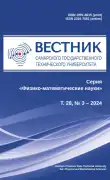Разработка и сравнительный анализ математических моделей функционирования региональной энергосистемы Самарской области
- Авторы: Зотеев В.Е.1, Сагитова Л.А.1, Гаврилова А.А.1
-
Учреждения:
- Самарский государственный технический университет
- Выпуск: Том 28, № 3 (2024)
- Страницы: 586-608
- Раздел: Математическое моделирование, численные методы и комплексы программ
- URL: https://journal-vniispk.ru/1991-8615/article/view/311042
- DOI: https://doi.org/10.14498/vsgtu2091
- EDN: https://elibrary.ru/IWFHMA
- ID: 311042
Цитировать
Полный текст
Аннотация
Системные исследования деятельности региональной энергосистемы с целью повышения эффективности управления энергетическим комплексом с учетом вклада используемых ресурсов принципиально невозможны без совершенствования математических моделей и методов их идентификации на основе статистических данных.
В статье приводятся результаты анализа известного математического описания функционирования региональной энергосистемы, на основе которого отмечаются существенные недостатки, негативно влияющие как на достоверность оценок основных показателей эффективности энергетического комплекса, так и на точность прогноза, сделанного на основе построенной модели.
В работе рассматриваются и систематизируются по трем основным группам как различные трехфакторные регрессионные модели, так и ковариационно-стационарные модели временных рядов на основе линейной и нелинейной регрессии. Описаны алгоритмы численных методов среднеквадратического оценивания параметров этих моделей на основе результатов наблюдений. Приведены результаты математического моделирования динамики выпуска продукции энергосистемы на основе статистических данных, публикуемых в ежегодной отчетности региональных министерств и энергетических компаний. Проведен статистический анализ полученных результатов. Сравнительный анализ разработанных математических моделей на основе оценки погрешности прогноза позволил выбрать из рассматриваемой совокупности моделей наиболее эффективную математическую модель с минимальной ошибкой прогноза на период времени от одного года до пяти лет.
Полный текст
Открыть статью на сайте журналаОб авторах
Владимир Евгеньевич Зотеев
Самарский государственный технический университет
Email: zoteev.ve@samgtu.ru
ORCID iD: 0000-0001-7114-4894
SPIN-код: 8547-1223
Scopus Author ID: 16456013300
ResearcherId: D-8245-2014
http://www.mathnet.ru/person38585
доктор технических наук, доцент; профессор; каф. прикладной математики и информатики
Россия, 443100, Самара, ул. Молодогвардейская, 244Ляйсан Акзамовна Сагитова
Самарский государственный технический университет
Email: l0410@mail.ru
ORCID iD: 0000-0002-0833-983X
SPIN-код: 5588-4106
https://www.mathnet.ru/person213377
старший преподаватель; каф. теплогазоснабжения и вентиляции
Россия, 443100, Самара, ул. Молодогвардейская, 244Анна Александровна Гаврилова
Самарский государственный технический университет
Автор, ответственный за переписку.
Email: a.a.gavrilova@mail.ru
ORCID iD: 0000-0001-6598-6518
https://www.mathnet.ru/person41413
кандидат технических наук, доцент; доцент; каф. управления и системного анализ теплоэнергетических и социотехнических комплексов
Россия, 443100, Самара, ул. Молодогвардейская, 244Список литературы
- Гаврилова А. А., Цапенко М. В. Синтез математических моделей региональной энергосистемы как многомерных производственных функций // Вестн. Сам. гос. техн. ун-та. Сер. Техн. науки, 2002. №14. С. 126–192.
- Колмыков Д. С., Гаврилова А. А. Модельный анализ эффективности функционирования региональных энергопроизводств / Труды Третьей Всероссийской научной конференции (29–31 мая 2006 г.). Часть 2: Моделирование и оптимизация динамических систем и систем с распределенными параметрами / Матем. моделирование и краев. задачи. Самара: СамГТУ, 2006. С. 93–96.
- Дилигенский Н. В., Гаврилова А. А., Салов А. Г., Гаврилов В. К. Модельный анализ эффективности совместного производства тепловой и электрической энергии региональной энергосистемой // Изв. высш. учебн. завед. Северо-Кавказск. регион. Техн. науки, 2008. №5. С. 37–40. EDN: JUPXNJ.
- Салов А. Г., Гаврилова А. А. Системный анализ и моделирование деятельности энергетических генерирующих предприятий с целью оценки эффективности их функционирования в условиях становления рыночных отношений // Вестн. Саратов. гос. техн. ун-та, 2008. Т. 1, №1. С. 86–91. EDN: JUIJHL.
- Салов А. Г., Гаврилова А. А., Иванова Д. В. Исследование экономических характеристик регионального промышленного комплекса методами статистического и модельного анализа // Научное обозрение, 2015. №15. С. 327–332. EDN: UXSICN.
- Салов А. Г., Гаврилова А. А., Князев П. А., Круглов В. А. Имитационное моделирование деятельности генерирующего комплекса на основе трехфакторной производственной функции // Градостроительство и архитектура, 2016. №3. С. 140–145. EDN: WWOJDJ. DOI: https://doi.org/10.17673/Vestnik.2016.03.23.
- Ivanova D. V., Salov A. G., Gavrilova A. A. Control algorithms development for manufacturing and economic systems activity // J. Phys.: Conf. Ser., 2018. vol. 1111, 012073. EDN: VZIFDX. DOI: https://doi.org/10.1088/1742-6596/1111/1/012073.
- Гаврилова А. А., Салов А. Г. Системная методология анализа и моделирования энергоэффективности генерирующих компаний. Самара: Научно-технический центр, 2021. 277 с. EDN: ZZZXNK.
- Абрамов А. П., Бессонов В. А., Никифоров Л. Т., Свириденко К. С. Исследование динамики макроэкономических показателей методом производственных функций. М.: ВЦ АН СССР, 1987. 62 с.
- Замков О. О., Толстопятенко А. В., Черемных Ю. Н. Математические методы в экономике. М.: МГУ, 1997. 368 с.
- Зотеев В. Е., Башкинова Е. В., Староквашева П. В. Математическое моделирование функционирования энергетической системы Самарской области / Перспективные информационные технологии (ПИТ 2020): Труды Международной научно-технической конференции. Самара: Сам. научн. центр РАН, 2020. С. 361–365. EDN: KVSGXT.
- Вучков И., Бояджиева Л., Солаков О. Прикладной линейный регрессионный анализ. М.: Финансы и статистика, 1987. 238 с.
- Draper N. R., Smith H. Applied Regression Analysis / Wiley Series in Probability and Statistics. New York: John Wiley and Sons, 1998. xvii+706 pp. DOI: https://doi.org/10.1002/9781118625590.
- Демиденко Е. З. Линейная и нелинейная регрессии. М.: Финансы и статистика, 1981. 302 с.
- Seber G. A. F., Lee A. J. Linear Regression Analysis / Wiley Series in Probability and Statistics. Hoboken, NJ: Wiley, 2003. xvi+557 pp.
- Box G. E. P., Jenkins G. M.; Reinsel G. C., Ljung G. M. Time Series Analysis. Forecasting and Control / Wiley Series in Probability and Statistics. Hoboken, NJ: John Wiley and Sons, 2016. 712 pp.
- Anderson T. W. The Statistical Analysis of Time Series / Wiley Classics Library. Chichester: John Wiley and Sons, 1994. xiv+704 pp.
- Kendall M. G., Stuart A. The Advanced Theory of Statistics. vol. 3: Design and Analysis, and Time-Series. London: Charles Griffin, 1976. x+585 pp.
- Otnes R. K., Enochson L. Applied Time Series Analysis. vol. 1: Basic Techniques. New York: John Wiley and Sons, 1978. xiv+449 pp.
- Kashyap R. L., Ramachandra Rao A. Dynamic Stochastic Models from Empirical Data / Mathematics in Science and Engineering. vol. 122. New York: Academic Press, 1976. xvi+334 pp. DOI: https://doi.org/10.1016/s0076-5392(08)x6016-3.
- Durbin J., Watson G. S Testing for serial correlation in least squares regression: I // Biometrika, 1950. vol. 37, no. 3/4. pp. 409–428. DOI: https://doi.org/10.2307/2332391.
- Грановский В. А., Сирая Т. Н. Методы обработки экспериментальных данных при измерениях. Л.: Энергоатомиздат, 1990. 288 с.
- Зотеев В. Е. Численный метод нелинейного оценивания на основе разностных уравнений // Вестн. Сам. гос. техн. ун-та. Сер. Физ.-мат. науки, 2018. Т. 22, №4. С. 669–701.EDN: YSDYZN. DOI: https://doi.org/10.14498/vsgtu1643.
Дополнительные файлы








